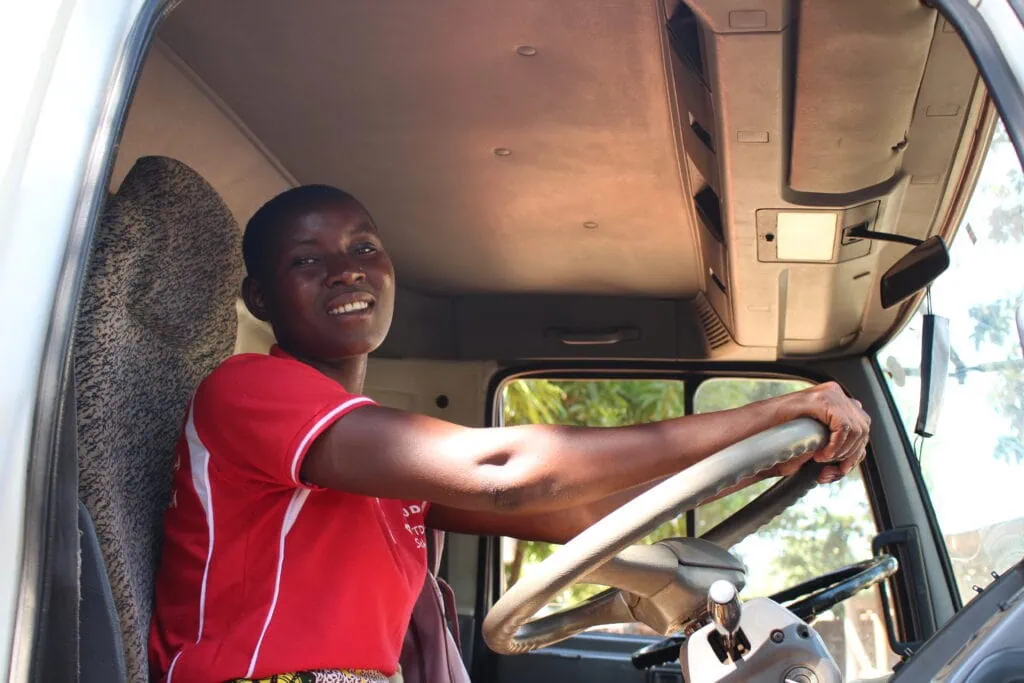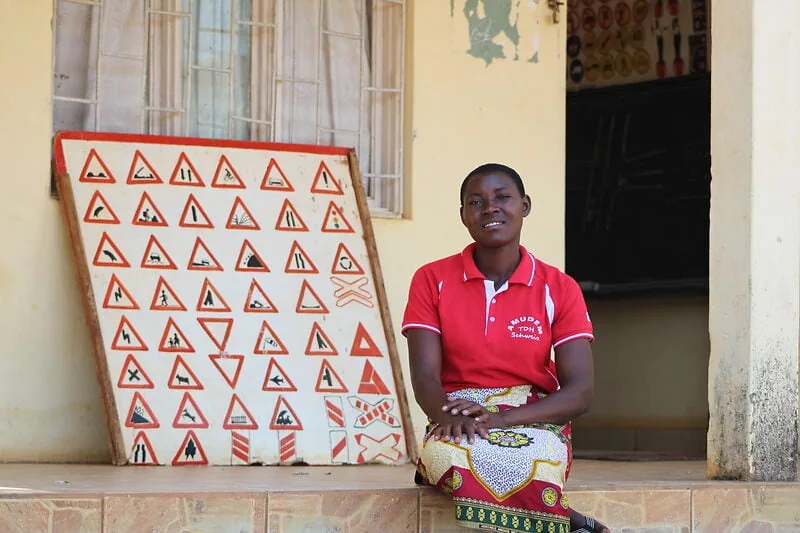In Mozambique, poverty and violence are part of everyday life for many girls and women. In the north-east of the country, our partner organization AMUDEM is working to change this. Through education and their own income, young women like Dorca Davide Matias are taking control of their own lives again.
When Dorca Davide Matias' (24) cell phone rings, it's usually work calling. Word has spread in her village that the young woman has a truck driver's license. "People call me when they need help with transportation," says Dorca. Drivers are in demand in the vast and rural region in north-eastern Mozambique where she lives. Dorca delivers sand, firewood, bricks - everything the people in her community need. She rents the truck from a neighbor. Dorca now earns a living for herself and her family with her transport service. "Thanks to my driving license, I've gained more independence," she says proudly. Anyone who knows her story knows the value of this independence for the young woman - she had to fight hard for it.
Dorca married at a very young age, like many women in her village. Her parents had died and the responsibility of looking after her two younger brothers weighed heavily on her shoulders. In this difficult situation, she had hoped to find support through marriage. But this quickly turned into a nightmare: after the wedding, her husband began to control her and drastically restrict her freedom of movement. "He forbade me to do everything. I was no longer allowed to go to school or open a business," says Dorca. During her marriage, she gave birth to two daughters. The fact that she had no other option but to be a housewife and mother was overwhelming - but the violence she was subjected to on a daily basis by her husband made the situation unbearable.
The way out of oppression
In Mozambique, domestic and sexual violence against girls and women is considered normal in many communities and families. It is not uncommon for young girls to be taught that they must obey their future husbands, including in sexual matters. Many of those affected are therefore not even aware that they are victims of gender-based violence. For Dorca, years of oppression passed before she found a way out. When she could no longer stand her husband's violence, she fled to her aunt. She offered her crucial support: together they sought help from our partner organization AMUDEM.
At the AMUDEM center, Dorca not only found a safe place, but also received psychosocial support to help her come to terms with what she had experienced. In workshops, she also learned how to protect herself from unwanted pregnancies and gender-based violence. But what gave her the most strength was the regular exchange with other women who had had similar experiences.
Dorca took part in radio debates to raise awareness of issues relating to sexual and reproductive health and rights. She also spoke on the radio about her personal story: "This is how I can prevent girls from my region from getting into the same situation that I went through."
Today, Dorca knows that what she suffered was a violation of her rights. And she is committed to ensuring that such acts no longer go unpunished: she encourages affected women to report the violence they have experienced. Thanks to the awareness-raising work of our partner organization, a change in thinking is taking place in many communities. One important step forward was the national ban on early marriages in 2019.
With education to independence
For Dorca, returning to school was a decisive step on the way to a self-determined life. She resumed lessons where she had once had to interrupt them. "That was the moment our marriage ended for good. My husband left me alone with the children," Dorca recalls. But she adds resolutely: "But I didn't mourn him." Thanks to the support of AMUDEM, she was able to graduate from school.

With renewed self-confidence, Dorca seized her next opportunity: she prepared for her truck driving test at the AMUDEM center. Today, she has her driver's license in her pocket and drives the truck safely through the streets. That gives her hope. At just 24 years old, Dorca has the responsibility of looking after a family of five - a heavy burden. But now that she is her own boss, she can determine the direction her life takes. And she can pursue her dreams: "I want to use the money I earn as a driver to train as a teacher," she reveals.




